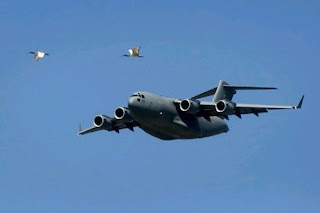Boeing, the world's largest aircraft maker, has a "historic window of opportunity" to boost its military business in the Middle East and Asia-Pacific as countries such as the UAE upgrade their defence systems, the company says.
The aerospace giant is seeking to increase international defence sales within its overall defence business from 10 per cent last year to 25 per cent by 2013, at a time when it faces incremental growth in the US.
GCC states, as well as India, Japan and Australia, are among countries leading the way, with heavy investments in military aircraft programmes.
"Right now we see the Middle East and Asia-Pacific in a recapitalization phase, and there is a historic window of opportunity where they are looking to upgrade and procure new capabilities," said Chris Chadwick, the president of Boeing Military Aircraft.
The UAE is set to become the world's third-largest operator of Boeing C-17 heavy lift military transport aircraft, after the US and UK, with deliveries for six planes starting this year. "We will deliver four this year and two next year," Mr Chadwick said.
The aircraft will give the UAE Armed Forces an added measure of mobility at a time when it is beginning to flex its muscles regionally in peacekeeping, anti-piracy and humanitarian missions. In the past two weeks, the UAE has sent 12 fighter jets to join NATO and Qatar in enforcing the no-fly zone in Libya, and successfully deployed special forces off the coast of Oman to rescue a Dubai-bound ship from pirates.
According to US congressional notifications and industry estimates, Boeing is in line to earn up to US$11.4 billion (Dh41.87bn) of orders for equipment, long-term logistical support and training from the UAE, Qatar and Kuwait on pending and recently closed aircraft sales.
That includes a proposed sale of one C-17 to Kuwait with long-term support of the aircraft; the sale of two C-17s to Qatar with long-term support and training; and the six C-17s for the UAE.
The UAE is also considering buying 16 additional Chinook military transport helicopters and 30 Apache attack helicopters from Boeing.
Catering to the UAE's desire to forge industrial partnerships with its contractors, Boeing is also in negotiations for a wide-ranging alliance with Mubadala Development, a strategic investment company owned by the Abu Dhabi Government.
In Saudi Arabia, Boeing is also expected to win the lion's share of an estimated $60bn of arms deals with the US that includes F-15 fighter jets as well as Little Bird and Apache helicopters.
Boeing has also provided the UAE with information on its F-18 fighter jet, although company officials stopped short of calling it a formal request.
The company has been encouraged by its progress in establishing relationships with emerging nations that had not previously purchased western military aircraft.
Boeing has established a foothold in Qatar's defence market by selling the two C-17s and is positioning itself for a new fighter jet campaign there. It opened its first office in the country in December.
India and Brazil are also important emerging markets. "Five years ago, we did not do business in India from a defence perspective," Mr Chadwick said.
Now Boeing is in line for a potential $5.8bn order for 10 C-17 aircraft from India, and its F-18 is one of six finalists for one of the biggest prizes in global aerospace - a contract for 126 fighter jets worth an estimated $10bn.
"This is an exciting historic time frame for international engagement," he said. In addition to existing international customers, Boeing has "new emerging markets like India and Brazil, where they would really like to move to western technology", Mr Chadwick said. "We believe we are very well positioned for that."
(C) TheNational.ae

Boeing always going.
ReplyDeleteDubai daily